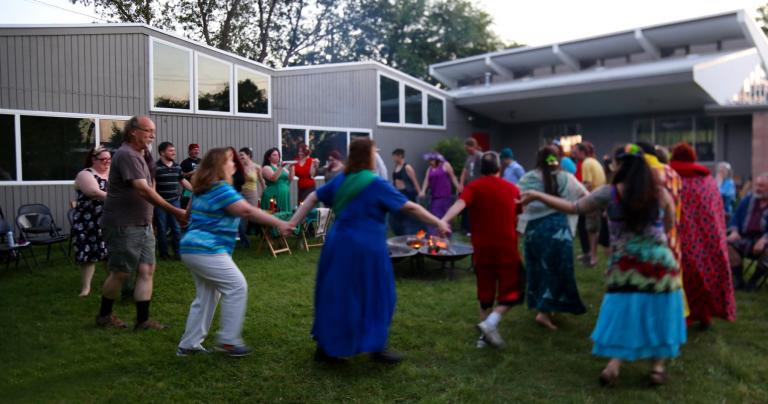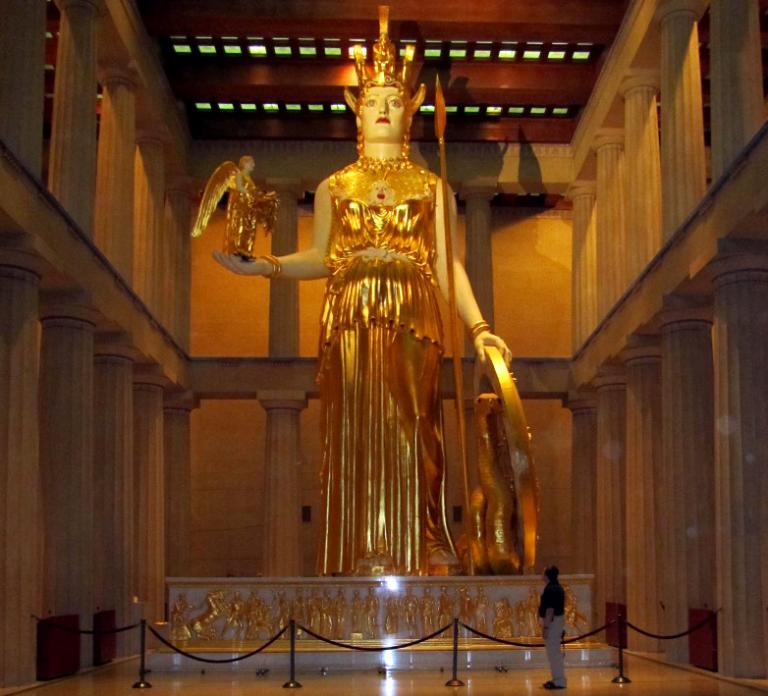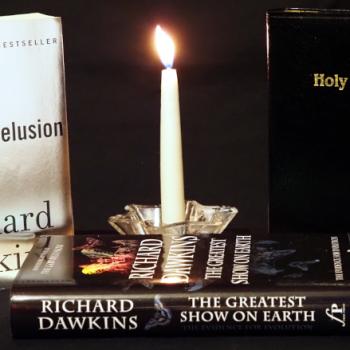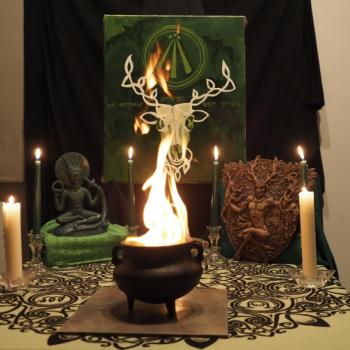Last week there was a discussion of polytheism in the CUUPS Facebook group. This made me very happy.
While CUUPS is open to anyone who wants to explore Paganism from a Unitarian Universalist perspective, polytheists are rare. In my experience, most CUUPS members would describe themselves as pantheists or as non-theists – if they would describe themselves at all.
I try to raise the visibility of polytheism within CUUPS. When I was asked to contribute an essay to Pagan and Earth-Centered Voices in Unitarian Universalism, I gave it the subtitle “Why Unitarian Polytheism Isn’t An Oxymoron.”

I’m a polytheist because I’ve had first-hand experiences of mighty spirits (i.e. – Gods) who showed themselves to be real, distinct, and individual. If I was relying strictly on books I might be content to call this “the great Mystery” and leave it at that. But I’m not. I had my own experiences, and I was able to compare them to the experiences of contemporary polytheists and to what we know of polytheism in ancient times. And so I’m a polytheist.
When CUUPS National conducted a survey in 2014, we found that 82% of respondents reported some first-hand experience of spirits. I was part of that survey team and I had access to the free-form text responses. My conclusion was that while experiences of Gods and spirits are common, most people don’t have the context to make sense of their experiences, and they’re unsure what they should say about them. They worry about people making fun of them, or thinking they’re crazy. So they don’t explore the experiences they have, and they don’t work at the kinds of things that promote and facilitate further experiences.
And still, there is a hunger for the first-hand experience of the Gods. Last week’s Conversations Under the Oaks included a question about the best way to hear and communicate with the Gods. There was another question about journeying in the Otherworld, a related subject. People want to see and feel and do this themselves.
What’s stopping them?
In last month’s Toward a Common Polytheist Theology, I quoted from Morpheus Ravenna’s keynote address from the 2015 Many Gods West conference:
People often find it difficult to separate the psychological experience of an archetypal form from a spiritual experience of a God, because the knowledge of how to recognize the difference is a matter of not just subtle awareness, but also trained awareness.
There are two important points here: subtle awareness and trained awareness. And there’s a third point: context.
Subtle awareness
If you’re ever near Nashville, go to Centennial Park and visit the Parthenon. Inside is a re-creation of the statue of Athena that was in the original Parthenon in Athens. You climb a set of steep, narrow stairs to get to the temple level. When you reach the top of the stairs you turn around and there She is: all 42 feet of Her. She is NOT subtle – this is a Goddess presented in all the majesty that a human craftsperson can create. This is a beautiful work of sacred art, even though it is officially “cultural” and not “religious.”
But this statue and the various entertainment-driven depictions of the Gods can set impossible expectations.
Our first-hand experiences of the Gods Themselves are rarely so big. They are never so physical. They are subtle – a thought that could be yours, except it isn’t. Knowing something you had no way of knowing. Things out of place. Coincidences that defy the laws of probability. All things that are easy to overlook.
Why are They subtle and not obvious? Why do we not see Athena walking bodily down the streets in a robe of brilliant gold? I don’t know. I suspect that kind of visibility simply isn’t important to Them. Perhaps They’re not interested in the kind of attention it brings. They’re looking for people who will embody Their virtues and help with Their work, not who constantly hit Them up for favors. And so They approach us more subtly.
There’s a reason why mystics of every religion teach contemplative practices – they teach us how to see. When you can learn to block out background noise, your mental replay of today’s events, and your worries about what’s going to happen tomorrow and just concentrate on the image and values and virtues of a God, you’re a long way toward being able to recognize Their subtle presence.
Polytheist context
It is no surprise that people living in a culture dominated by monotheism have little or no context for polytheist experiences. And so they try to interpret their experiences in a monotheist context, or in an atheist context. That doesn’t work particularly well.
When the Gods of our ancestors stopped being worshipped as Gods, They lived on in human society as natural features, as characters in literature, as expressions in language, and as the principles They personify. We didn’t forget the Gods (most of them, anyway) – we forgot They are Gods.
We forgot the prayers and offerings we used to honor Them. We forgot the rituals we used to connect with Them. We lost the temples and statues and priesthoods. We lost the religious context for first-hand experiences of the Gods.
Or such things were stolen from us.
This is why I advocate for cooperation between polytheist groups and traditions of widely different backgrounds. Even if they worship different Gods from different places in different ways, they’re all promoting polytheist concepts. And that helps all of us create the context for understanding our own religious experiences.
Last year I spoke on “Religion and Bad Assumptions” at several Pagan gatherings, and also at Denton UU. The text of that last service is here. I talked about the need to recognize the unstated monotheist and atheist assumptions in our religions and how to replace them with a Pagan and polytheist context. This includes animism, ancestors, relationships, and the primacy of religious experience.
We must create a polytheist context for our religious experiences.
Trained awareness
I don’t know exactly what Morpheus Ravenna had in mind when she said “trained awareness,” but I know what that phrase means to me.
First of all, it means it takes practice. It’s fair to say I became a polytheist at the Summer Solstice in 2004. It was two years before my first ecstatic experience of a God. It was another three years before my second – I was a bit distracted with the ordinary world during that time. After that, though, I started working on it more regularly and the experiences started coming more frequently. The more you practice, the better you get at it.
It also means things will go better if you have help. For all that Denton CUUPS is a CUUPS group filled with Pagans of all description, for the past eight or nine years we’ve had a significant number of polytheists. I’ve had good, educated, dedicated support for my studies and practices. I like to think I’ve provided the same in return. It’s best if you have experienced priests and elders to advise you, but a group of peers can help each other figure things out as you go, particularly if you draw on more knowledgeable sources in books and on the internet.
Ancient polytheism was never a solitary thing. It was always something people did together as tribes and communities, as priesthoods and as orders. Different people took different roles, but they all played their parts. Our modern polytheisms will go better if we work together as well.

Conversations worth having
The CUUPS Facebook polytheist discussion began when someone asked a question: “I need some insight on polytheism…” There were quite a few responses from quite a few perspectives. Some of them I agree with, and some of them I don’t. The questioner will have to consider them and make up his own mind. If he or some of the people who read without commenting become polytheists, great. If they decide to go elsewhere, that’s great too.
Regardless, those of us who are polytheists will need to continue building a polytheist context for our practices and experiences, and we’ll need to continue to develop our subtle and trained awareness of the Gods.


















